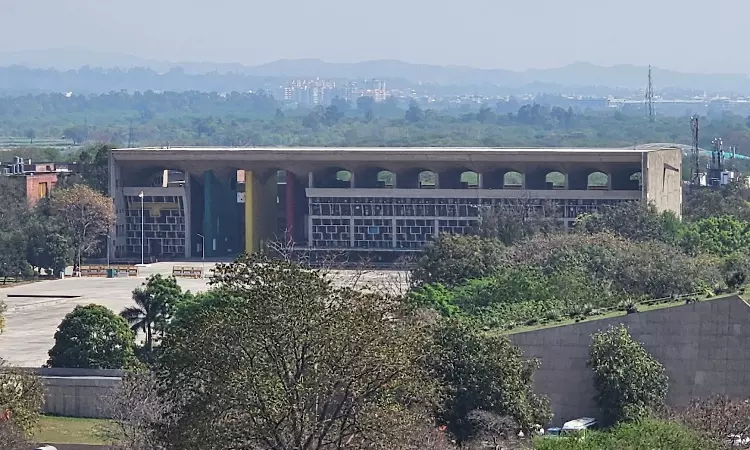- Home
- /
- High Courts
- /
- Punjab and Haryana High Court
- /
- High Court Stays Punjab Land...
High Court Stays Punjab Land Pooling Policy, Seeks Safeguards For Farmers, Artisans
Aiman J. Chishti
7 Aug 2025 5:33 PM IST
The Punjab & Haryana High Court today ( August 07) stayed the controversial 'Punjab Land Pooling Policy' after the Government refused to withdraw it, till the next date of hearing (September 10).The Punjab Land Pooling Policy 2025, approved by the Bhagwant Mann government, aims to promote planned and sustainable urban development projects across the state, particularly by curbing...
The Punjab & Haryana High Court today ( August 07) stayed the controversial 'Punjab Land Pooling Policy' after the Government refused to withdraw it, till the next date of hearing (September 10).
The Punjab Land Pooling Policy 2025, approved by the Bhagwant Mann government, aims to promote planned and sustainable urban development projects across the state, particularly by curbing the proliferation of illegal colonies and consolidating fragmented land parcels. A central aspect is its voluntary nature, encouraging landowners (farmers) to pool their land for development, unlike compulsory acquisition methods.
However, the same has received criticism from farmers' bodies and opposition parties have expressed resistance, perceiving the policy as a "land-grabbing scheme" that could displace farmers and impact agricultural practices.
A bench of Justice Anupinder Grewal and Justice Deepak Manchanda, expressed concern over the lack of provisions in the policy for farmers, village artisans, and landowners who would potentially be rendered landless by the project. The Court also noted the absence of a timeline for the project's completion and highlighted that there is no redressal mechanism in place for the aggrieved persons.
"A large number of land owners and others who themselves do not own the land, viz. landless labourers, artisans, MGNREGA workers and those carrying out other occupations in the villages, but are otherwise dependent on the said land for their livelihood, would be affected and there is no provision for their resettlement and rehabilitation under the Land Pooling Policy of the State," it added.
The Court also questioned the Government for not conducting compulsory Social Impact Assessment before identifying the land to be acquired.
"the State proposes to take over tens of thousands of acres of fertile land in the entire State of Punjab for carrying out its proposed development work, without carrying out any Social Impact Assessment or Environmental Impact Assessment study, although a stand is taken that the assessment would be carried out later when they have definite information about the number of land owners who have opted for the scheme. It has been held by the Supreme Court in several cases that before permitting urban development, the State ought to carry out an environmental impact assessment," it added.
The Court opined that the land which is sought to be acquired is amongst the most fertile land in the State of Punjab and it is possible that it may impact the social milieu.
During the hearing, Advocate General Maninderjit Singh Bedi and Senior Advocate Gurminder Singh, appearing for the Punjab Government, submitted that the policy is voluntary in nature. Singh explained that land suitable for the development project is identified, and the corresponding khasra numbers are advertised to invite expressions of willingness from the landowners. “Only if the landowner consents, the land is acquired in exchange for developed houses.”
The policy aims at “curbing the mushrooming of illegal colonies in Punjab….otherwise State will turn into a slum”, Singh added.
The Punjab Government also clarified that the Social Impact Assessment is not required at this stage because the development work has not started yet and the acquisition is not done under Right to Fair Compensation and Transparency in Land Acquisition, Rehabilitation and Resettlement Act, 2013 (2013 Act).
It further submitted that the projects will not be handed over to any private builders for development.
Senior Advocate Shailendra Jain Amicus Curiae in the matter said that, carrying out the Social Impact Assessment before identifying the land is important and compulsory as per the Apex Court's guidelines and not carrying it under the policy would create an “unreasonable classification” between the 2013 Act and Policy.
The plea filed by a resident of Ludhiana Gurdeep Singh Gill submitted that in terms of the Land Pooling Policy, 2025, notified on 04.06.2025), around 26,000 acres of land in Ludhiana District had been notified for setting up of residential and commercial projects.
The petitioner, a resident of Village Phagla and is owner of 6 acres of land, which had been allotted to his father as a displaced person in lieu of their land in District Lyallpur, Pakistan. They have invested and have made improvements to the land which is now fertile but has been included in the impugned policy.
He also contended the Policy is discriminatory against small land owners as it has been set out in Clause H(II) of the Land Pooling Policy that those offering 9 acres of land for land pooling would be given 3 acres for group housing while a land owner offering 50 acres would be returned 30 acres for plotted development, whereas the petitioner owns 6 acres of land and would be given only about an acre in return.
Click here to read/download the order
Title: GURDEEP SINGH GILL VS STATE OF PUNJAB AND ANOTHER



